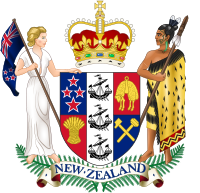
The economy of New Zealand is a highly developed free-market economy. It is the 52nd-largest national economy in the world when measured by nominal gross domestic product (GDP) and the 63rd-largest in the world when measured by purchasing power parity (PPP). New Zealand has a large GDP for its population of 5 million, and sources of revenue are spread throughout the large island nation. The country has one of the most globalised economies and depends greatly on international trade – mainly with Australia, Canada, China, the European Union, Japan, Singapore, South Korea and the United States. New Zealand's 1983 Closer Economic Relations agreement with Australia means that the economy aligns closely with that of Australia.

The economy of Australia is a highly developed mixed economy. As of 2020, Australia was the 13th-largest national economy by nominal GDP, 18th-largest by PPP-adjusted GDP, and was the 25th-largest goods exporter and 20th-largest goods importer. Australia took the record for the longest run of uninterrupted GDP growth in the developed world with the March 2017 financial quarter, the 103rd quarter and marked 26 years since the country had a technical recession. Its GDP was estimated at A$1.3 trillion as of 2020.

The term Rogernomics, a portmanteau of "Roger" and "economics", was coined by journalists at the New Zealand Listener by analogy with Reaganomics to describe the neoliberal economic policies followed by Roger Douglas. Douglas was Minister of Finance in the Fourth Labour Government of New Zealand, 26 July 1984 to 2 November 1990. Rogernomics was characterised by market-led restructuring and deregulation and the control of inflation through tight monetary policy, accompanied by a floating exchange rate and reductions in the fiscal deficit. Douglas came from a background of Labour Party politics. His adoption of policies more usually associated with the political right, and their implementation by the Fourth Labour Government, were the subject of lasting controversy.

The national debt of the United States is the total debt, or unpaid borrowed funds, carried by the federal government of the United States, which is measured as the face value of the currently outstanding Treasury securities that have been issued by the Treasury and other federal government agencies. The terms "national deficit" and "national surplus" usually refer to the federal government budget balance from year to year, not the cumulative amount of debt. A deficit year increases the debt, while a surplus year decreases the debt as more money is received than spent. In general, government debt increases as a result of government spending and decreases from tax or other receipts, both of which fluctuate during the course of a fiscal year. There are two components of gross national debt:

The minister of Finance, originally known as colonial treasurer, is the head of the New Zealand Treasury, responsible for producing an annual New Zealand budget outlining the government's proposed expenditure. The position is often considered to be the most important cabinet post after that of the prime minister.

Sir Michael John Cullen is a former New Zealand politician. He served as Deputy Prime Minister of New Zealand, also Minister of Finance, Minister of Tertiary Education, and Attorney-General. He was the Deputy Leader of the Labour Party from 1996 until November 2008, when he resigned following a defeat in the general election. He resigned from Parliament in April 2009, to become the deputy chairman of New Zealand Post from 1 November 2009 and chairman from 1 November 2010. On 6 March 2020 he announced that he had resigned from the Lakes and Bay of Plenty district health boards, respectively. At the same time he also announced that he had been diagnosed with stage 4 small-cell lung cancer, which had also spread to his liver.

Sir Walter Nash was a New Zealand politician who served as the 27th Prime Minister of New Zealand in the Second Labour Government from 1957 to 1960. He is noted for his long period of political service, having been associated with the New Zealand Labour Party since its creation.

David Francis Caygill is a former New Zealand politician. Caygill was born and raised in Christchurch. He entered politics in 1971 as Christchurch's youngest city councillor at the age of 22. He served as a Member of Parliament (MP) from 1978 to 1996, representing the Labour Party. A supporter of Rogernomics, he served as Minister of Finance between 1988 and 1990. From 2010 to 2019, he was one of the government-appointed commissioners at Environment Canterbury.

The New Zealand Treasury is the central public service department of New Zealand charged with advising the Government on economic policy, assisting with improving the performance of New Zealand's economy, and managing financial resources.

The New Zealand budget for fiscal year 2006–2007 was presented to the New Zealand House of Representatives by Finance Minister Dr Michael Cullen on 18 May 2006.

The history of the United States public debt started with federal government debt incurred during the American Revolutionary War by the first U.S treasurer, Michael Hillegas, after its formation in 1789. The United States has continuously had a fluctuating public debt since then, except for about a year during 1835–1836. To allow comparisons over the years, public debt is often expressed as a ratio to gross domestic product (GDP). Historically, the United States public debt as a share of GDP has increased during wars and recessions, and subsequently declined.

The post-2008 Irish economic downturn in the Republic of Ireland, coincided with a series of banking scandals, followed the 1990s and 2000s Celtic Tiger period of rapid real economic growth fuelled by foreign direct investment, a subsequent property bubble which rendered the real economy uncompetitive, and an expansion in bank lending in the early 2000s. An initial slowdown in economic growth amid the international financial crisis of 2007–2008 greatly intensified in late 2008 and the country fell into recession for the first time since the 1980s. Emigration, as did unemployment, escalated to levels not seen since that decade.

The Canadian federal budget for the 2008-2009 fiscal year was presented to the House of Commons of Canada by Finance Minister Jim Flaherty on February 26, 2008.

The history of United States debt ceiling deals with movements in the United States debt ceiling since it was created in 1917. Management of the United States public debt is an important part of the macroeconomics of the United States economy and finance system, and the debt ceiling is a limitation on the federal government's ability to manage the economy and finance system. The debt ceiling is also a limitation on the federal government's ability to finance government operations, and the failure of Congress to authorise an increase in the debt ceiling has resulted in crises, especially in recent years. The debt ceiling has been suspended since October 30, 2015.

The New Zealand budget for fiscal year 2014/15 was presented to the New Zealand House of Representatives by Finance Minister Bill English on 15 May 2014. This was the sixth budget English has presented as Minister of Finance.

The New Zealand budget for fiscal year 2010-2011 was presented to the New Zealand House of Representatives by Finance Minister Bill English on 20 May 2010.

The New Zealand budget for fiscal year 2009-2010 was presented to the New Zealand House of Representatives by Finance Minister Bill English on 28 May 2009.

The New Zealand budget for fiscal year 2007-2008 was presented to the New Zealand House of Representatives by Finance Minister Dr Michael Cullen on 17 May 2007.
The Crown Retail Deposit Guarantee Scheme was an opt-in deposit insurance scheme, established under the Public Finance Act 1989 in New Zealand during the Great Recession, 2008 to 2011. Dr Michael Cullen, Finance Minister at the time of the scheme's introduction said, "The deposit guarantee is designed to give assurance to New Zealand depositors. The New Zealand banking system remains sound. We want to ensure that ordinary New Zealanders feel that their deposits are safe in the current uncertain international financial market conditions."

The New Zealand budget for fiscal year 2017/18 was presented to the New Zealand House of Representatives by Finance Minister Steven Joyce on 25 May 2017. It was the ninth budget of the Fifth National Government, and the first presented by Joyce in his role as Minister of Finance. This was the last budget presented by the Fifth National government which was defeated at the 2017 general election.













